|
1. Preparation
2. Feeding
3. Grooming
4. Training
5. Health
1. Preparation – Bringing Your Puppy Home
PHILOSOPHY
Roycroft has been in existence since 1976. My goal has always
been to produce the most temperamentally sound, healthy and
beautiful Cavaliers I possibly can. That is why every single
Cavalier used in my breeding program has been officially tested
for hip dysplasia, patellar luxation, and inherited eye problems
before being bred; as well as being cardiologist cleared of
Mitral Valve Disease within one (1) year of the date of
breeding. Also, when necessary, DNA testing is done for all
Cavalier issues. If both parents are double clear, the puppies
are automatically DNA clear by parentage and DNA testing is no
longer necessary. This is because if each parent didn’t inherit
a gene for the issue from either of its parents, it doesn’t have
the gene to give to offspring. Offspring are then automatically
clear. These test results are part of my Puppy Packet to you as
I am proud of my commitment to produce the best Cavaliers
possible, but good health does not end there.
CARE
I want your dog to get the best of natural care you can possibly
provide. This includes living in a "clean" environment. What
this means is that lawn chemicals should be limited to the areas
of your yard where your puppy will not regularly walk or play
in. Flea preventatives should not be used unless absolutely
necessary. Do not feed your Cavalier "junk" food--occasional
treats are okay. Do NOT overfeed your Cavalier--I CANNOT STRESS
THIS ENOUGH!!!Make sure your Cavalier has yearly checkups
(every six months for elderly dogs) and that your vet checks
everything I listed in my Manual. Preventative maintenance is
the best policy. Treat your Cavalier just as you would a child.
BRINGING YOUR PUPPY HOME
Before you bring your Cavalier puppy home, you would be wise to
have in your possession the following items. Some of these items
are pictured. Suggestions on where to purchase them are:
www.amazon.com,
www.revivalanimal.com,
and
www.cherrybrook.com.
**Crate**
Either an 18 X 24 inch or 21 X 30 inch wire crate,
or a 200 Vari-Kennel Size
**Mats/Bedding**
for the bottom of the crate
**Water Bowl**
a 1 quart size metal or ceramic bowl
**Food Bowl**
a 1 pint size metal or ceramic bowl
**Dog Food**
More on that under Feeding
**A flat natural bristle brush (below top)**
**A
slicker brush
(below bottom)**
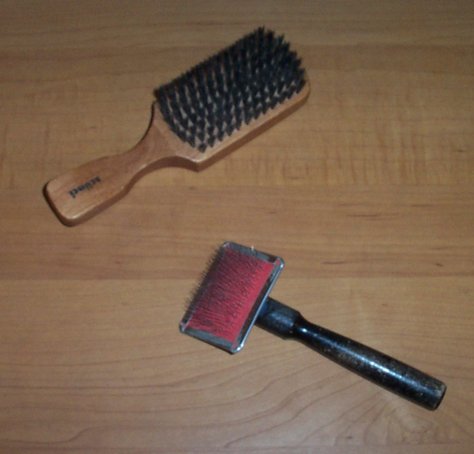
**A fine or medium toothed comb**
**A
flea comb
(both below)**
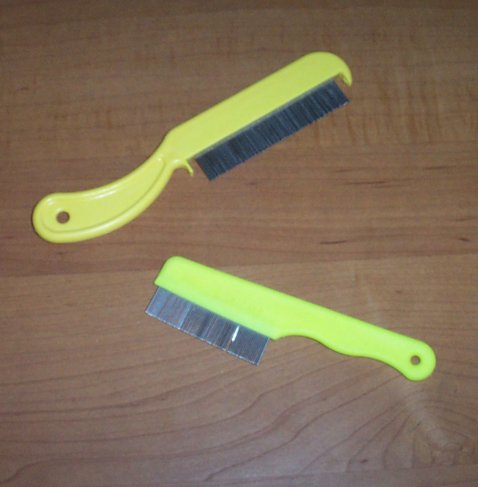
**A blunt-nosed scizzors**
for tangles and feet
**A
nail cutter
(below)**
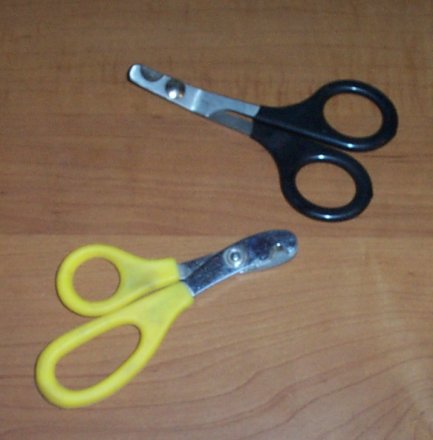
**Dog
Shampoo/Conditioner
(below)**
White on White is great for blenheims and tricolors
There are others for rubies and black & tans
Some of my favorite brands include Isle of Dogs
and Chris Christensen

**Collar
or Harness**
My favorite collar is the Coastal adjustable collar.
It is a nylon type, about 3/8 inches wide, fully
adjustable from puppy to adult, with an easy
on/off snap closure. They come in many colors and patterns.
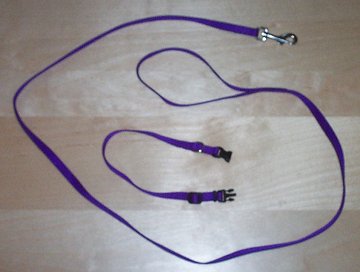
Shown below is a harness.

**A
regular 4 or 6 foot lead**
Either a leather one, a webbed one, or one that matches the
collar
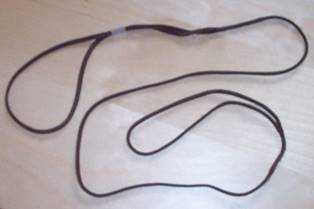
**A
show lead**
shown above
This is a small nylon loop lead, approximately 4 ft. long.
This is excellent for indoor training.
**Toothbrush**
Finger brush or small soft-bristled children's type
**Doggie Toothpaste**
**A clicker**
**Some dog toys and raw marrow bones**
Some favorite toys are fleecy ones, buster cubes which you put
treats into, kong types. I
do not suggest rawhides, pigs ears, etc. due
to risk of salmonella poisoning to the humans in the family,
plus many
digestive obstructions that need surgery are due to these items.
There are better choices.
Track down a veterinarian if you don't already have one--before
the puppy arrives--as you will need to take your puppy to your
vet within the first few days of its arrival. Ask your friends,
relatives and neighbors for references if you don’t already have
one. Visit vets, check out their clinic and personnel--rely on
your common sense to tell you if this is the place you want your
dog's health attended to.
Your puppy will come with a Health Record signed by the vet who
checked the puppy out. Record of vaccinations can be found on
this certificate. All puppies are wormed every 2 weeks from age
4 weeks to 10 weeks.
|






